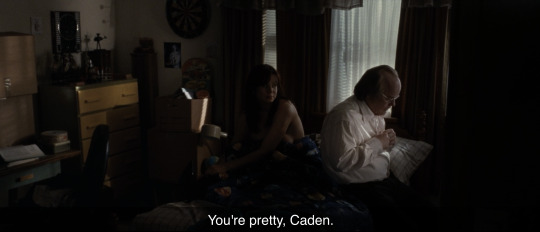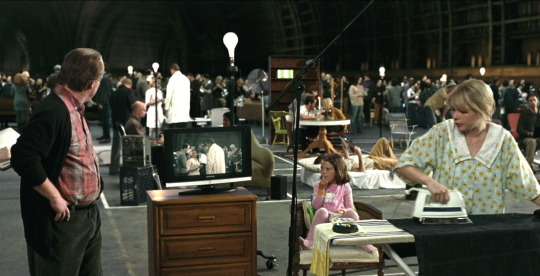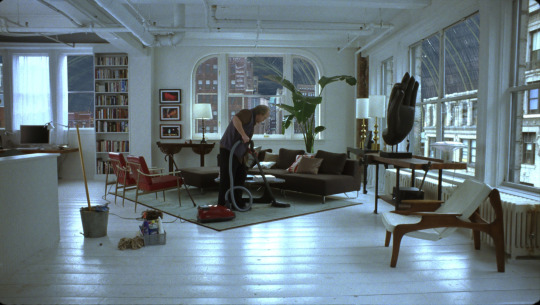Don't wanna be here? Send us removal request.
Text
Synecdoche, New York

I just watched Synecdoche, New York.
There will be spoilers, but I don’t think the point of this movie is in its plot. You might need to watch it twice anyway.
What you probably know about it is: “A theatre director [Caden] struggles with his work, and the women in his life, as he creates a life-size replica of New York City inside a warehouse as part of his new play”. This is bollocks.
I.
Synecdoche, New York is a movie about how it feels to be stuck with no self-love, not knowing that you need it, not knowing how to get it. Never being loved unconditionally. Spending your whole life in this state. Having no idea what’s wrong with you.
Caden’s wife doesn’t even dislike his play—she doesn’t think it’s worth anything. “I can't get excited about your restaging someone else's old play, it just... There's nothing personal in it.” Later she leaves him.
Pretty Hazel is into Caden. But when she finally gets him to come to her place, she makes him beg for a kiss:
—Does [the drink] make you wanna kiss me? —Kind of. —Tell me why. —Because I feel a lot of longing. —Beg a girl, why don't you? —Please, Hazel. —On your knees. [...] I want you to beg me on your knees for a kiss.
During sex, Caden breaks down and starts crying: “I'm just really confused. I'm sorry. I... I'm really sick. And I think I'm dying”. Hazel’s response is “You should go”.
Fast forward, Caden is old now. Scroll to the title image and back. He is going to have sex with Tammy—an actress playing Hazel in his play. “You're very pretty”, he tells her, and follows with “Sometimes I wish I could be pretty like that”. Maybe he could’ve gotten unconditional... something... if he was a girl.
—What, you wish you were a girl? —Sometimes I think I might have been better at it.
Tammy tells Caden that he’s pretty, but he doesn’t believe it. Immediately after they are shown in a car. It’s morning. Tammy goes “I shouldn’t have drunk so much fucking beer last night”—his fear, I think, is validated.
Before dying, Caden’s daughter asks him “I want to forgive you, but I need you to ask for forgiveness first”. He begs, and then she says “I cannot forgive you” and dies.
II.
What does Caden do with all this?
After getting a MacArthur grant for his previous work, he decides to write a play. “You see, the idea is to do a massive theater piece. You know, uncompromising, honest”. So he buys a huge warehouse and hires a lot of actors.

How do you write something uncompromisingly honest? Caden addresses the assembled troupe during their first meeting:
“We'll start by talking honestly, and out of that, a piece of theater will evolve. I'll begin. I've been thinking a lot about dying lately.”
We don’t see anybody else “beginning”, though. For the rest of the movie, it’s mostly just Caden’s life. An actor playing Caden, and an actor playing Hazel. An actor playing Caden’s second wife, and an actor playing her new boyfriend after she leaves Caden. Paralleling everything happening to Caden in real life.
I had a similar idea when I was a kid, in a long-distance relationship (and my first relationship overall). “I had better save all chat logs”, I thought. “Later I will write a book about this relationship—just the whole history of it. It will be so awesome. Everybody will love it. And be jealous, too.”
Caden’s idea is: “if I show people my life, maybe this will amount to something”.
It’s not narcissistic rage (“and they will see how I suffered”). He doesn’t try to embellish anything, doesn’t try to present himself better than what he is, doesn’t try to draw a lesson. “Theater piece. Something big and true and tough. I'm gonna finally put my real self into something. [...] The MacArthur is called ‘the genius grant’, and I wanna earn it.”
In other words—if he manages to show people his true self, his idea of human experience (both his and others’), they will love him.
III.
Charlie Kaufman, the writer and director of Synecdoche, New York, doesn’t talk about it much. But it doesn’t matter, because three years after the movie he gave a lecture pretty much explaining it. I talked about it on my other blog—Charlie Kaufman does public self-therapy.
[When writing, do yourself, not somebody else.] It isn’t easy but it’s essential. It’s not easy because there’s a lot in the way. In many cases a major obstacle is your deeply seated belief that you are not interesting. And since convincing yourself that you are interesting is probably not going to happen, take it off the table. Think, ‘Perhaps I’m not interesting but I am the only thing I have to offer, and I want to offer something. And by offering myself in a true way I am doing a great service to the world, because it is rare and it will help.’
Caden tried it, but missed a crucial ingredient. He is not trying to help the world by offering his understanding of human experience—he is trying to sell himself.
But more importantly, if you’re honest about who you are, you’ll help that person be less lonely in their world because that person will recognise him or herself in you and that will give them hope. It’s done so for me and I have to keep rediscovering it. It has profound importance in my life. Give that to the world, rather than selling something to the world.
This is what he doesn’t do. He does it to be counted as a genius. He thinks he’s dying, and he wants to prove himself, to amount to something. Kaufman hopes to change himself by being honest about his experience—Caden thinks he’s already good enough, but nobody sees it.
Caden spends forty years trying to create a truly monumental play, all just to get someone, anyone, to relate to him. Imagine that.
IV.
In the end, by some twist of dream logic Caden merges with another character—Ellen, who was Caden’s runaway wife’s cleaning lady.
As a side-note: if you’ve seen the movie—note how Caden finds comfort in doing Ellen’s job. Cleaning is the only thing he does that is directly useful to others. It has meaning. If only he had figured it out earlier.

The shot above is not from the end of the movie. What happens in the end is better.
Everybody has left the set. Caden sees a woman. “Would you sit with me for a moment? Because I'm very tired and lonely.”
She does not reject him. She does not roll her eyes. They sit together. The woman is Ellen’s mother. “I feel like I've disappointed you terribly”, he goes. “Oh, no. I am so proud of you”, she replies.
By this time, he is no longer the director of his own play. He’s given up the role. He wears an earpiece telling him what to do, how to act.
“Ask her if you can put your head on her shoulder”, instructs the earpiece.
—Can I lay my head on your shoulder? —Yes. —I love you. —I love you too.
At last, unconditional love.
And then he dies.

P.S.
Kaufman’s preface to the published version of the movie script:
They want me to write an introduction to this thing. They’re pestering me. This guy, Keith, at Newmarket Press. [...] So here I am, as I knew I would be once I agreed to having this thing published, trying to write an introduction and being mad at Keith. I don’t even know Keith. I’ve never seen him, as far as I know, which may be completely untrue. I may have met him forty times and not paid attention. I don’t even know his job title, that’s how much Keith and this screenplay book are part of my life.
[...] He’s an annoyance to me. That is all he is. But if I stop and think about it, which I just did, if I try to broaden my view of the world, which I just did, I realize that every moment I exist as me, Keith exists as Keith. He is not the occasional letter in my e-mail box. Every moment of every day, he is living a life somewhere far away from me. As an experiment, I decided to e-mail Keith and ask him to tell me a bit about himself.
[...] Wow. Keith’s letter did way more than I anticipated. Now I love Keith. Now I feel a connection with him. There are so many things I love about Keith’s letter. Not the least of which is his willingness to participate and his openness in talking about himself, his leap of faith that I would not abuse the confidence. I love that he took me seriously. It made me think: How many hundreds of people have worked on this film whom I’ve never had a conversation with, whom I don’t know at all, didn’t think it was important to know?
0 notes
Text
Fool Us: Kostya Kimlat and the Roadrunner Cull
This is my favorite bit from Penn & Teller: Fool Us—Kostya Kimlat does a trick that Penn & Teller did before, but better (?).
I love the way he’s chatting with them,
I love the way Penn gets angry,
and I love the backstory (in another video below), where Penn goes “Teller and I know every method for doing that trick, we know it inside out, and that was his kind of ‘Oh? That trick you did on The Today Show? I’m now going to show you how it’s done’”
youtube
The backstory:
youtube
0 notes
Text
The Office: “Greatness is only skin-deep”
Another small weird speech from The Office, starting at 1:08. I love it when people do “imply something bad, but make it hard to understand what precisely is being implied”—and I don’t see it often enough.
youtube
Off the top of my head I can only remember one other example—from Would I Lie To You. Starting at 1:45 and going until “I know that’s rude, but I can’t quite figure out why” at 2:12:
youtube
0 notes
Text
The Office: the “salesman of the year” speech
One of my favorite speeches comes from The Office. Here it is!
The context is: Dwight is giving a speech, as a salesman of the year, to ~500 other salesmen. It’s weird and awesome; I love rewatching it and paying attention to Dwight’s intonation. It’s super refreshing to see this kind of thing in a sitcom.
The speech starts at 2:40.
youtube
2:40 “Blood alone moves the wheels of history” comes from Mussolini. Dwight’s speech is a better Mussolini speech than the actual Mussolini’s speeches, because Mussolini’s speeches are in Italian and I don’t know Italian.
3:50 The laughter! I bet he’s listening to his own voice and can’t contain the excitement. I do this too when I feel like I’m nailing a speech, though it usually shows as ultra-sarcasm instead of laughter.
4:19 “I say—salesmen (and women) of the world—unite. We must never acquiesce, for it is together—together that we prevail! We must never cede control of the motherland, for it is together that we prevail!”. This is an example where intonation and sentence boundaries don’t quite match, and it’s wonderful to listen to.
4:24 “Unite” in particular sounds unfinished even though it’s the end of the sentence—why? Probably because at this point the speech is not a series of points, but a series of bits (cf. “cede control of the motherland”). It’s very hard to figure out the intonation if you don’t have a good idea of what your points are—which is e.g. why inexperienced speakers often do giant run-on sentences. If you ever have to give a speech, figure out what you want to say first.
0 notes